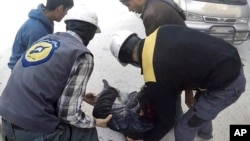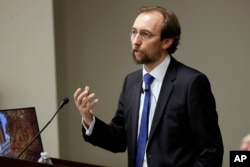The U.N. rights chief is calling for perpetrators of crimes in eastern Ghouta, a besieged enclave in Syria, to be held accountable and for an independent investigation into recent events.
U.N. High Commissioner for Human Rights Zeid Ra’ad al Hussein opened a special session on the situation in eastern Ghouta at the Human Rights Council in Geneva Friday with a litany of incidents that have taken place in the Damascus suburb, which has been under siege for half a decade.
Zeid spoke about the denial of food, medicine and other relief to the 400,000 residents of this besieged area. He described the trauma experienced by tens of thousands of severely malnourished children, forced to live in basements to survive the relentless airstrikes by Syrian forces.
Zeid recounted the bombing of hospitals, schools and markets and the release of toxic agents that reportedly have killed two children. He said the actions in eastern Ghouta and elsewhere in Syria are likely war crimes, and potentially crimes against humanity.
"Civilians are being pounded into submission or death," Zeid said. "The perpetrators of these crimes must know that they are being identified, that dossiers are being built up with a view to their prosecution; and that they will be held accountable for what they have done."
The high commissioner said Syria must be referred to the International Criminal Court so that justice can be done.
In response, the Syrian ambassador accused Zeid of being selective and biased in his positions and blamed terrorist factions for the situation in eastern Ghouta. Hussam Edin Aala said terrorist rocket attacks on residential areas in Damascus have hit schools, hospitals, diplomatic missions and military positions.
The ambassador said they have killed hundreds of civilians, inducing government forces to respond to protect the civilians against terrorism.





